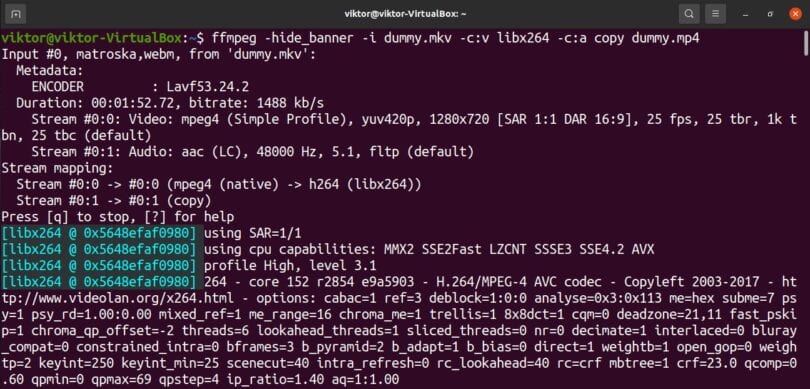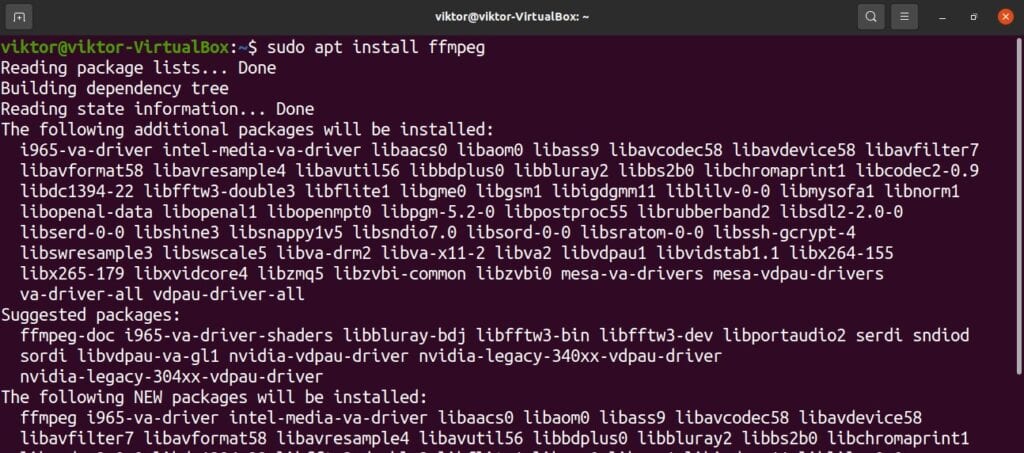
- #How to install ffmpeg bash stackovelfwo how to
- #How to install ffmpeg bash stackovelfwo driver
- #How to install ffmpeg bash stackovelfwo windows 10
- #How to install ffmpeg bash stackovelfwo code
I think you should be using a video editor or player to find natural cut points just shy of 10 minutes apart.Īssuming your file is in a format that YouTube can accept directly, you don't have to reencode to get segments. That will put cuts right in the middle of sentences, even words. You pay for the latter with a certain complexity.Īll that aside, I don't think you really want to be cutting at exactly 10 minutes for each clip. The linked article describes fast-but-inaccurate and slower-but-still-accurate alternative formulations. Where I have it now is slow but accurate. Wrapping this up into a script to do it in a loop wouldn't be hard.īeware that if you try to calculate the number of iterations based on the duration output from an ffprobe call that this is estimated from the average bit rate at the start of the clip and the clip's file size unless you give the -count_frames argument, which slows its operation considerably.Īnother thing to be aware of is that the position of the -ss option on the command line matters. $ ffmpeg -i source-file.foo -ss 1200 -t 600 third-10-min.m4v $ ffmpeg -i source-file.foo -ss 600 -t 600 second-10-min.m4v
#How to install ffmpeg bash stackovelfwo how to
How to install the NVIDIA drivers on Ubuntu 18.$ ffmpeg -i source-file.foo -ss 0 -t 600 first-10-min.m4v.

#How to install ffmpeg bash stackovelfwo driver
#How to install ffmpeg bash stackovelfwo windows 10


In this tutorial, we saw how to install CUDA on Ubuntu 20.04 Focal Fossa Linux. To comply with the CUDA compiler requirements switch your default GCC compiler to version 8 or lower. usr/local/cuda-10.2/bin/./targets/x86_64-linux/include/crt/host_config.h:138:2: error: #error - unsupported GNU version! gcc versions later than 8 are not supported!ġ38 | #error - unsupported GNU version! gcc versions later than 8 are not supported!

#How to install ffmpeg bash stackovelfwo code
As a result upon the code compilation with the Nvidia CUDA compiler you might receive the following error: In file included from /usr/local/cuda-10.2/bin/./targets/x86_64-linux/include/cuda_runtime.h:83, Next, use nvcc the Nvidia CUDA compiler to compile the code and run the newly compiled binary: $ nvcc -o hello hello.cuĪt the moment CUDA does not support GCC compiler higher then version 8 when installed from CUDA Ubuntu 18.04 sources. Int i = blockIdx.x*blockDim.x + threadIdx.x ĬudaMemcpy(y, d_y, N*sizeof(float), cudaMemcpyDeviceToHost) Void saxpy(int n, float a, float *x, float *y) Save the following code into a file named eg. Check CUDA version to confirm the installation:Ĭopyright (c) 2005-2019 NVIDIA CorporationĬuda compilation tools, release 10.2, V10.2.89Ĭonfirm the installation by compiling an example CUDA C code.$ echo 'export PATH=/usr/local/cuda/bin$' > ~/.bashrc Once ready, set your path to point to CUDA binaries:.At this stage all should be ready to install CUDA.$ sudo wget -O /etc/apt/preferences.d/cuda-repository-pin-600 Execute the following commands to enable CUDA repository. To do so follow our guide on How to install the NVIDIA drivers on Ubuntu 20.04 Focal Fossa Linux. In case you have not done so yet, make sure that you have installed the Nvdia driver for your VGA.


 0 kommentar(er)
0 kommentar(er)
